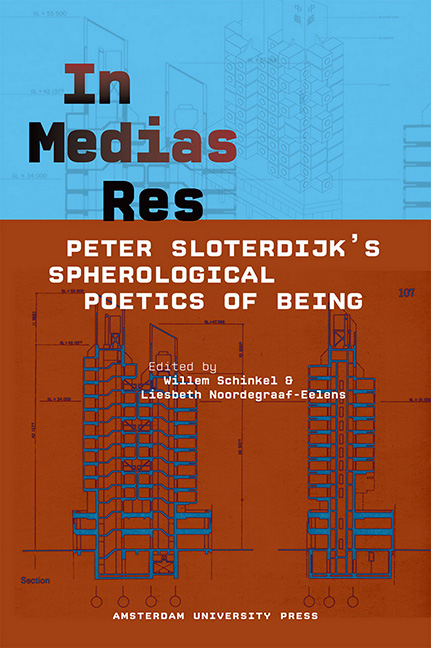Book contents
- Frontmatter
- Contents
- 1 Peter Sloterdijk’s Spherological Acrobatics: An Exercise in Introduction
- 2 Foamy Business: On the Organizational Politics of Atmospheres
- 3 “Transgenous Philosophy”: Post-humanism, Anthropotechnics and the Poetics of Natal Difference
- 4 Disinhibition, Subjectivity and Pride. Or: Guess Who Is Looking?: Peter Sloterdijk’s reconstruction of ‘thymotic’ qualities, psychoanalysis and the question of spectatorship
- 5 Sloterdijk and the Question of an Aesthetic
- 6 Uneasy Places. Monotheism, Christianity, and the Dynamic of the Unlikely in Sloterdijk’s Work – Context and Debate
- 7 The Attention Regime: On Mass Media and the Information Society
- 8 In the Beginning was the Accident: The Crystal Palace as a Cultural Catastrophe and the Emergence of the Cosmic Misfit: A critical approach to Peter Sloterdijk’s Weltinnenraum des Kapitals vs. Fyodor M. Dostoevsky’s Notes from the underground
- 9 A Cautious Prometheus? A Few Steps Toward a Philosophy of Design with Special Attention to Peter Sloterdijk
- 10 Sloterdijk and the Question of Action
- 11 The Space of Global Capitalism and its Imaginary Imperialism: An Interview with Peter Sloterdijk
- Contributors
- Index
7 - The Attention Regime: On Mass Media and the Information Society
Published online by Cambridge University Press: 23 June 2021
- Frontmatter
- Contents
- 1 Peter Sloterdijk’s Spherological Acrobatics: An Exercise in Introduction
- 2 Foamy Business: On the Organizational Politics of Atmospheres
- 3 “Transgenous Philosophy”: Post-humanism, Anthropotechnics and the Poetics of Natal Difference
- 4 Disinhibition, Subjectivity and Pride. Or: Guess Who Is Looking?: Peter Sloterdijk’s reconstruction of ‘thymotic’ qualities, psychoanalysis and the question of spectatorship
- 5 Sloterdijk and the Question of an Aesthetic
- 6 Uneasy Places. Monotheism, Christianity, and the Dynamic of the Unlikely in Sloterdijk’s Work – Context and Debate
- 7 The Attention Regime: On Mass Media and the Information Society
- 8 In the Beginning was the Accident: The Crystal Palace as a Cultural Catastrophe and the Emergence of the Cosmic Misfit: A critical approach to Peter Sloterdijk’s Weltinnenraum des Kapitals vs. Fyodor M. Dostoevsky’s Notes from the underground
- 9 A Cautious Prometheus? A Few Steps Toward a Philosophy of Design with Special Attention to Peter Sloterdijk
- 10 Sloterdijk and the Question of Action
- 11 The Space of Global Capitalism and its Imaginary Imperialism: An Interview with Peter Sloterdijk
- Contributors
- Index
Summary
Sloterdijk's work observed through the lens of current social theory
Peter Sloterdijk is not exactly a social theorist in the ongoing academic sense. One will look in vain in his books for elaborated conceptual arguments, lengthy discussions of the views of canonized social scientists, or the kind of meticulous step-by-step reasoning that tries to convince the sceptic who is already well versed in the matter at hand. Sloterdijk prefers to think fast and overwhelms the curious reader of his sometimes biting, much more often ironic comments on contemporary society primarily with well-chosen metaphors instead of dry concepts. Several of his writings do nevertheless address in an interesting way at least three substantial issues within current social theorizing. The first one regards the nature of the social. What is the kind of proverbial stuff societies are made of? As Sphären (‘Spheres’), the title of his three-volume magnum opus, already indicates, Sloterdijk opts for a topological approach. In his view, societies indeed consist of ‘turbulent and asymmetrical associations of space-multiplicities’ or spheres. A sphere is an inner zone that acts as an atmosphere, as a space that links two or more individuals because it is filled with moods or vibes, inspirations, energies, and resonances or sympathies that produce mutual solidarities. The basic component of the social is the dyadic sphere, thus Sloterdijk asserts with much gusto against the idea that the social is composed of inter-subjective relations between autonomous subjects. A human subject is never alone but can only exist in the mode of co-subjectivity, as a being that is literally animated by past and actual words, gazes, voices… of others. In line with the recent ‘affective turn’ within social theorizing, and partly inspired by the writings of Gabriel Tarde, Sloterdijk thus points out the importance of non-linguistic forces for a correct understanding of the social. Not that ‘flows of desire’, a key expression in Deleuze and Guattari's Anti-Oedipus and also an influence acknowledged by Sloterdijk, animate social life. Sloterdijk rather advocates a social energetic view, an approach that tries to understand the phenomenon of human togetherness primarily in terms of shared energies, or immaterial forces that act upon the participants in social relations and produce various ‘communities of resonance’.
- Type
- Chapter
- Information
- In Medias ResPeter Sloterdijk's Spherological Poetics of Being, pp. 115 - 132Publisher: Amsterdam University PressPrint publication year: 2012



